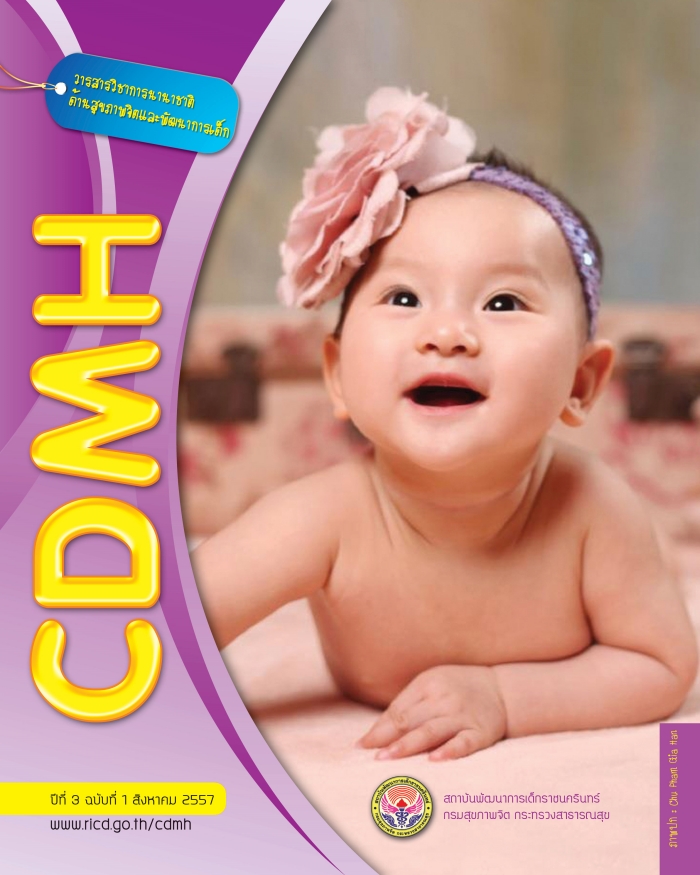Effectiveness of Implementing the Picture Exchange Communication Systems among Autistic Children, Rajanagarindra Institute of Child Development, Chiang-Mai Province
Main Article Content
Abstract
ปัญหาการใช้ภาษาและการสื่อสารในเด็กออทิสติก เป็นปัญหาสำคัญที่ต้องได้รับการช่วยเหลือ การส่งเสริมให้เด็กพูดเป็นวิธีการสื่อความหมายที่สำคัญที่สุด แต่ถ้ายังไม่สามารถพูดได้จำเป็นต้องหาวิธีการอื่นมาทดแทน การศึกษาครั้งนี้มีวัตถุประสงค์เพื่อศึกษาประสิทธิผลของโปรแกรมแลกเปลี่ยนภาพ เพื่อการสื่อสารในเด็กออทิสติก สถาบันพัฒนาการเด็ก
ราชนครินทร์ จังหวัดเชียงใหม่ กลุ่มตัวอย่างมี 2 กลุ่ม คือ 1) เด็กออทิสติกอายุ 5 -7 ปี ที่มีความรุนแรงของ
โรคระดับปานกลางขึ้นไป จำานวน 3 ราย ที่มารับบริการที่สถาบันพัฒนาการเด็กราชนครินทร์ระหว่าง
เดือนกันยายน ถึงเดือนธันวาคม พ.ศ. 2553 และ 2)บุคลากรทีมสุขภาพที่ใช้โปรแกรมแลกเปลี่ยนภาพ เพื่อ
การสื่อสารในเด็กออทิสติก จำานวน 2 ราย ประกอบด้วยนักเวชศาสตร์การสื่อความหมาย 1 ราย และ
พยาบาลวิชาชีพ 1 ราย เครื่องมือที่ใช้ในการศึกษา คือ 1) โปรแกรมแลกเปลี่ยนภาพเพื่อการสื่อสารในเด็กออทิสติก 2) แบบสอบถามข้อมูลส่วนบุคคล 3) แบบบันทึกผลการฝึกตามโปรแกรมแลกเปลี่ยนภาพ เพื่อการสื่อสาร 4) แบบวัดความ สามารถในการสื่อความหมายของเด็กออทิสติกปฐมวัย 5) แบบสอบถามความคิดเห็นของบุคลากรทีมสุขภาพ ต่อโปรแกรมแลกเปลี่ยนภาพเพื่อการสื่อสารในเด็กออทิสติก วิเคราะห์ข้อมูลด้วยสถิติเชิงพรรณนา ผลการศึกษาพบว่า การใช้โปรแกรมแลกเปลี่ยนภาพเพื่อการสื่อสารในเด็กออทิสติกอายุ 5-7 ปี ที่มีระดับความรุนแรงของโรคระดับปานกลางจำนวน 3 ราย ในช่วง 3 เดือน สามารถพัฒนาความสามารถด้านการสื่อสารเพิ่มขึ้นอย่างชัดเจนทั้ง 3 ราย เมื่อเปรียบเทียบก่อนและหลังการวิจัย และบุคลากรทีมสุขภาพมีความเห็นด้วยในทุกประเด็นคือ 1) ผลประโยชน์ที่ได้รับ 2) การเข้ากันได้ดีกับสิ่งที่มีอยู่เดิม 3) ความซับซ้อน 4) การทดลองได้ และ 5) การสังเกตได้จากผลการศึกษาแสดงให้เห็นถึงประสิทธิผลของการใช้โปรแกรมแลกเปลี่ยนภาพเพื่อการสื่อสารในเด็กออทิสติก และความเป็นไปได้ที่จะนำมาใช้ ในหน่วยงาน เพื่อเป็นทางเลือกหนึ่งที่จะช่วยให้เด็กออทิสติกที่มีความบกพร่องด้านการสื่อสารให้มีความสามารถด้านการสื่อสารเพิ่มขึ้นต่อไป
Speech and communication problems in autistic children are critical problems that needed
intervention. Speech enhancement f or these childrenis the most important method,however, if the children are unable to speak, other communication systems are needed. This research
aimed to study the effectiveness of implementing the Picture Exchange Communication Systems (PECS) among autistic children, Rajanagarindra Institute of Child Development (RICD), Chiang Mai. The subjects were divided into 2 groups including 1) Three autistic children aged between 5-7 years old who hade moderate severi ty of di sease and received treat ment program at RICD during September to December 2010, and 2) Two health
care personnels who used the Picture Exchange Communication Systems in autistic children including a speech pathologist and a registered nurse. Research instruments used in included 1) Picture Exchange Communication Systems (PECS) in autistic children. 2) Personal data questionnaires 3) Recording from of PECS 4) Communication Ability Measurement in preschool children, and 5) Program user questionnaire. Data were analyzed using descriptive statistics. The results revealed that after using PECS the three autistic children improved their communication dramatically comparing to preimplementation of the program. Moreover, the health care personnel agreed that the Picture Exchange Communication Systems was 1 ) relative advantage, 2) compatibility, 3) complexity,
4) trialability and 5) observability. These results indicated the effectiveness of
PECS and the feasibility to implement in routine care as another option to enhance autisti c
children’s communication capability.
Article Details
The authors retain copyright and permit the journal the copyright of first publication
Articles, once having passed the review process and accepted for publication in the CDMH Journal, are copyrighted under the CDMH Journal, Department of Mental Health, Ministry of Public Health. Please be aware distribution of CDMH Journal content for commercial purposes without permission is expressly prohibited. However, distribution with intent to educate, advocate, or spread awareness within the general public and research communities is permitted and encouraged with the understanding that the CDMH Journal Editorial Board do not hold jurisdiction or liability for any accompanying comments, text, or information from third parties, either in favor for or against the original article’s assertions, conclusions, methodology, or content.


